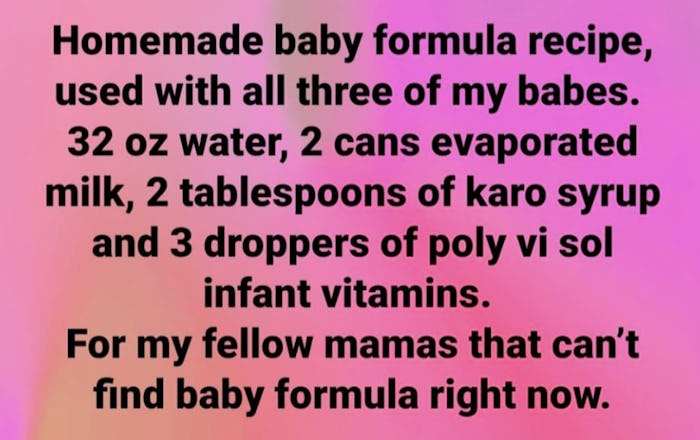Life

Guys, You Can't Make Baby Formula With Karo Syrup, Despite What Facebook Says
The spread of coronavirus is causing panicked overbuying of many household essentials: soap, toilet paper, disinfectants, and more. And as diapers and baby wipes start to vanish off store shelves, Facebook and Instagram posts about DIY emergency baby formula substitutes are cropping up all over social media. But are these recipes actually safe for babies? And if not, what’s a parent to do if they (and their local grocery stores) are fresh out of formula?
Jeanna Jackson, clinical nutrition and lactation director at Children’s of Alabama, tells Romper in an interview that medical professionals have not been warned of any formula shortages. “We have been told that currently there are not any nationwide manufacturer shortages of formula. If there are temporary shelf shortages due to patients buying in bulk, I would recommend calling your food bank, WIC office, pediatrician, or pediatric hospital,” she says.
“It is extremely rare for a parent in a developed country to be unable to find formula, as formula companies have a comprehensive crisis management system in place,” says Jody Segrave-Daly, RN, IBCLC, cofounder of the Fed Is Best Foundation, in an interview with Romper. She cites Similac’s crisis management statement as an example.
So these experts feel that the buzz around DIY formula isn’t necessary at this time. But if the apocalypse really were to strike and no formula could be found, Segrave-Daly says the World Health Organization (WHO) has formula replacement guidelines, but they need to be followed precisely in order to be safe. Also, the American Academy of Pediatrics (AAP) doesn’t agree with them.
“In the event you find yourself in a dire emergency without formula and your baby needs fed, The World Health Organization has guidelines,” she says. “Possible breast milk substitutes include commercial infant formula, liquid animal milk — cow or goat, powdered animal milk, and evaporated milk. Each milk source has specific instructions that include adding boiled water, sugar, and a daily micronutrient recipe according to the age of the baby. All other kinds of milk are unsuitable for small infants. The AAP does not recommend any homemade formula and provides resources for parents to contact.”
Danielle Downs Spradlin, IBCLC at Oasis Lactation Services, cautions against using formula alternatives when speaking with Romper. If formula becomes hard to find, the ingredients to make your own could be even more of a challenge to locate.
“The hardest thing about homemade baby formula is that the ingredients needed, like vitamin additives and novel carbohydrate sources, are much harder to find than commercial formula, especially in emergencies,” Spradlin says. “If the formula is not mixed correctly, the consequences can be catastrophic. If a family chooses food supplementation, they should reach out to their doctor and lactation consultant for the safest way to follow the protocol.”
For now, these experts agree the best thing to do is buy your normal amount of formula and keep feeding your baby as usual. If you ever find your local stores are out of formula, there are resources to check with before resorting to potentially unsafe DIY recipes.
“The best thing to do is continue feeding your baby normally,” says Spradlin. “Do not add additional water to formula to ‘stretch’ it. Do not hold the baby off to go longer between feeds. Some formula resources include local WIC offices, your pediatrician may have formula in the office, area food banks, area women's shelters, religious organizations such as churches and synagogues, hospitals, birthing centers, and early childhood education centers. If you are combo-feeding, reach out to your lactation consultant to help optimize your milk production and reduce dependence on formula. If you recently discontinued lactation, you may be able to resume lactation with the help of a lactation consultant.”
And in the event that you do see formula shelves looking bare, try to buy responsibly so that other families don’t run out of formula options either.
“If you are someone purchasing your own formula, choose one that does not have the WIC symbol next to it if it’s possible,” says Jackson. “People who use WIC can’t switch to another brand or kind.”
Experts:
Jeanna Jackson, clinical nutrition and lactation director at Children’s of Alabama
Jody Segrave-Daly, RN, IBCLC, cofounder of the Fed Is Best Foundation
Danielle Downs Spradlin, IBCLC, CLC, NOMAS, BRMT, of Oasis Lactation Services
This article was originally published on